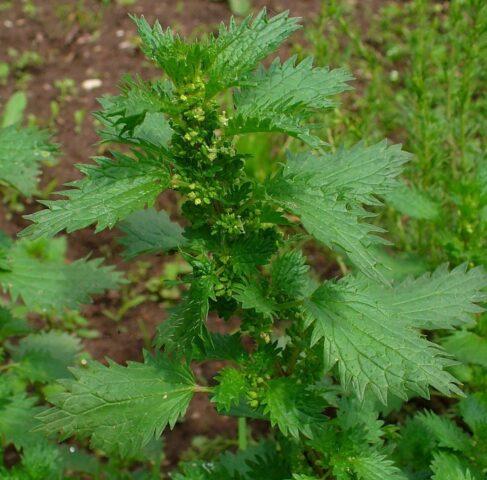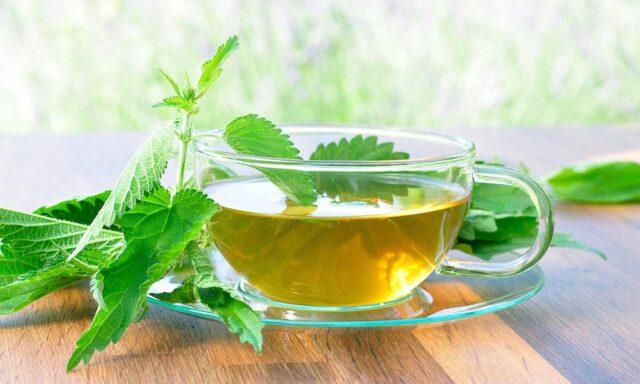Content
The properties of nettle for blood are determined by the presence of biologically active components: vitamins, histamine, glycosides, flavonoids, tannins and others. These are valuable organic compounds that speed up the metabolism and lead to a "soft", gradual cleansing. It is also noted that nettle stimulates hematopoiesis and partly contributes to the processes of coagulation, especially in the form of a strong alcoholic tincture.
How stinging nettle affects blood
It is widely believed that nettle thickens the blood. And in this regard, it cannot be used in food for people with increased coagulability, with a tendency to form blood clots, varicose veins, atherosclerosis and other diseases.
This idea is due to the fact that nettle contains vitamin K (more precisely, the K1 form: phylloquinone), which really contributes to blood clotting in case of damage (injury, scratch). However, studies have shown that only a thick alcoholic extract of nettle (tincture on alcohol 60%) has a significant effect on this process. Moreover, the coagulation rate increases only by a third (32.4-33.3%).
As for water extracts (this is soup, tea, broth), as well as fresh leaves and stems, they do not have a significant effect on the formation of blood clots. Thus, nettle does not thin the blood, on the contrary, it thickens it. But this influence is extremely insignificant (with the exception of alcoholic infusion). Therefore, moderate consumption of fresh nettles and in dishes is allowed for all people.
The composition and value of the plant
The plant also includes a number of other valuable components:
- B vitamins;
- vitamin C;
- carotene;
- histamine;
- tannins;
- glycosides;
- choline;
- vegetable proteins;
- cellulose;
- phytoncides;
- gum;
- phenolic compounds;
- trace elements (manganese, iron, boron, copper, titanium, nickel, chromium, molybdenum).

Nettle leaves and stems contain many biologically active substances that accelerate metabolism and cleanse the body
Nettle has a positive effect not only on the blood, but also on other systems. Thanks to its application, the following occurs:
- improvement of metabolic processes;
- increased immunity;
- stimulating digestion;
- cleansing the body from half-life products ("slags");
- normalization of blood glucose levels;
- stimulating appetite.
Nettle has:
- calming;
- anti-inflammatory;
- anticonvulsant;
- anti-aging;
- expectorant;
- milk-producing;
- antiseptic;
- mild analgesic (on joints and above) effect.
Why nettle is good for blood
The benefits of the herb are not only that it promotes blood clotting. Leaves and stems contain biologically active components that accelerate metabolism. Nettle cleanses the blood. Taking it in moderation:
- stimulates the processes of hematopoiesis;
- increases the synthesis of prothrombin in the liver, which stops bleeding;
- helps to cure anemia (anemia - a reduced number of red blood cells).
Indications for use
The beneficial effect of the plant has been scientifically proven, therefore it is used not only in folk, but also in official medicine. The leaves and stems of stinging nettle and dioecious are used for the prevention and treatment of various diseases of the respiratory, cardiovascular and other body systems. The herb is used for bleeding, hemorrhoids, liver and gall bladder problems, tuberculosis, gout, rheumatism, whooping cough, anemia, allergies.
Nettle cleanses the blood and strengthens the body. Therefore, it can also be used by healthy people to prevent viral infections, increase stress resistance, and prevent metabolic disorders.
Application methods
Nettle is not used to thin the blood because it thickens the blood. But in the case of aqueous forms (juice, broth, tea), this effect is hardly noticeable. The use of the plant allows you to strengthen the body, normalize metabolism and cleanse blood vessels.
Decoction
To prepare a decoction of nettle, take 1 glass of raw materials and pour 500 ml of water at room temperature. Put in a water bath, bring to a boil and keep on low heat for 15–20 minutes. Then the container is wrapped up and insisted under a ceramic lid for 2-3 hours (until it cools completely). It is taken orally in half a glass 3 times a day before meals.

Nettle decoction is easy to make at home
It can be stored in the refrigerator or other cool place for a maximum of 2 days.
Juice
Freshly squeezed stinging nettle juice is used to cleanse the blood and treat anemia. The leaves are washed and crushed to obtain juice. Take 1 tsp. inside before lunch (3 times a day).
Tea
Dried leaves are used to make tea. Take 10 g of nettle (1 tbsp. L.) And pour a glass of boiling water. Cover with a ceramic lid, can be wrapped in a cloth. Insist for three hours (until it cools completely), then filter. Drink tea during the day - half a glass in the morning and the same in the evening.
There is another recipe: take 25 g of nettle (2 heaped tablespoons) and pour 750 ml of boiling water. Insist for 10 minutes, then strain and take 1/3 cup 8-10 times during the day.
Application rules
Nettle has a beneficial effect on the body, but this does not mean that it can be taken by all people and in any quantity. The herb has both limitations and contraindications. Even a healthy person may develop an individual intolerance to certain components. If an allergic reaction occurs, the herbal drink should be stopped immediately and a doctor should be consulted.
In general, it is no more than 30 days, less often - up to three months (with weekly breaks every 3-4 weeks).

Nettle tea is taken daily for a month.
Can i take during pregnancy and hepatitis B?
There is no strict ban on taking the herb during pregnancy and during breastfeeding. Nettle tea can be used even in the third trimester, as well as immediately after childbirth. For taste and health, you can add mint, raspberries, lemon, or honey in small amounts to it.
At the same time, you cannot start the course on your own - you will need a doctor's consultation. During breastfeeding, taking nettle can provoke allergies and metabolic disorders in the baby. Therefore, it is better to postpone the use of decoctions.
At what age can children
According to the general rules, children can be given nettles from the age of twelve. Toddlers don't need this herb. Even if a child has a blood clotting problem, doctors prescribe other, more effective remedies.
Limitations and contraindications
There is no direct connection between nettle and the formation of blood clots (platelet clots) in the blood. But this does not mean that the broth and alcohol tincture can be consumed uncontrollably.In some cases, there are restrictions and contraindications to the use of such funds:
- increased blood clotting;
- renal failure;
- fluid retention;
- tumors;
- upcoming operations;
- individual intolerance to individual components.
Also, nettle should be taken with caution by patients with severe pathologies: cerebrovascular accident, heart attack, thromboembolism and others. In these cases, you need to especially strictly adhere to the doctor's recommendations and not self-medicate.
Conclusion
The blood properties of nettle are mainly related to positive effects only. The medicinal herb promotes cleansing, improves clotting processes, rejuvenates the body and strengthens the immune system. Nettle should not be considered as a remedy for all diseases. This is only an additional measure of treatment or prevention. If the doctor has established a certain course of therapy, then it should be considered as a priority.








